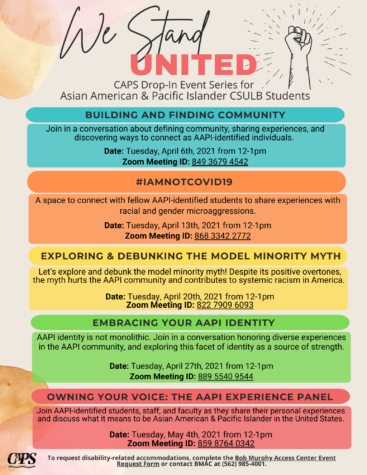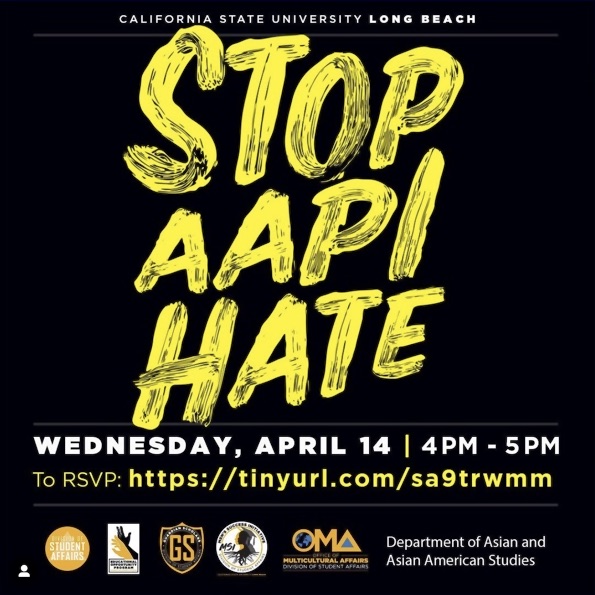Russell Jeung, co-founder of the Stop AAPI Hate project, discussed the rise in hate crimes towards Asian Americans and Pacific Islanders and the lingering trauma of incidents in a virtual event on April 14.
Jeung, a professor of Asian American Studies at San Francisco State University, joined the Office of Multicultural Affairs for the event, which is part of CSULB’s Asian American Pacific Islander Heritage Month Celebration.
“We created Stop AAPI Hate last year in March because we knew from Asian American History [that] whenever a disease came from Asia, Asians were quick to be blamed for it,” Jeung said in his virtual presentation. “They would face racism and racist policies, and we wanted to document what was happening because people wouldn’t believe that Asian Americans wouldn’t face issues like this.”
According to Jeung, one of the primary reasons as to why Asian Americans are being targeted for so much hate during the pandemic is due to “political rhetoric.”
“The term ‘Chinese virus’ has been really deadly,” Jeung said. “Words do matter. What that term did was that it racialized the biological virus.”
Jeung continued on by saying how the term “Chinese virus” kept getting repeated until it became a viral term, then hate speech and then hate violence.
It didn’t take long for the Stop AAPI Hate project to receive many reports of hate crimes towards the Asian American and Pacific Islander communities.
“We were flooded with hundreds of incidents and they were horrific,” Jeung said. “If you read them daily, you wouldn’t be surprised that this year, Asian American elderly have been attacked and killed because of hate.”
Jeung also shared some real life reports from Asian American citizens in California, during the workshop:
- “I was out shopping and a child grabbed my arm. The child said I should go back to my country and I was the reason his father died. The mother came up and put her hand on my arm. She didn’t try to help. Bakersfield occasionally has ignorant people who make fun of how I talk and look, and tell me to go home. But this is the scariest and saddest experience I’ve had in the U.S. since 1977,” (70 year-old, Bakersfield, CA).
- “As I was leaving a restaurant, a white male walked up to me and verbally harassed me; screaming ‘Go back to China,’ ‘You f***ing Asian,’ and other racial slurs; threatening me physically. This went on for several minutes as I departed the scene quickly to call the police. I gave a verbal account to an officer who arrived later, but I have not heard back from anyone,” (67 year-old, Alamo, CA).
Jeung also discussed the different forms of hate crimes, including verbal attacks, shunning or online assaults. He explained that microaggressions are also traumatizing incidents, which often involve “profanity, yelling and often gang bullying.”
“We just conducted a study of Stop AAPI Hate respondents, and one out of five are now displaying signs of racial trauma,” Jeung said. “That’s elevated depression, anxiety, hyper-vigilance and avoidance.”
According to the 2020-2021 Stop AAPI Hate National Report, the organization received a total of almost 3,800 reports of hate crimes, and about 68% of those reports were verbal attacks.
Jeung also mentions how people of the AAPI community are the most at risk of mental trauma during the coronavirus pandemic due to these racist attacks, mentioning a study conducted by Stop AAPI Hate that discovered that Asian Americans are more afraid of the constant racism than they are of the COVID-19.
“Think about that for a second,” Jeung said. “Asian American people are more fearful of other Americans and their racism than they are of a pandemic that killed five million people. That’s how widespread and scary this racism is.”

Jeung also stated during the event that despite all the hardship and racism Asian American people are facing during the coronavirus pandemic, he is proud to see Asian American citizens banding together in support of one another, and standing against racism.
“Asian Americans are flocking together at vigils to grieve and to find solace together,” Jeung said. “Asian Americans are flocking at rallies to find strength, get support and receive healing, as well as flocking back to Chinatown and Little Saigon [to] support both our businesses and elders who need escort.”
Jeung said that he hopes that the U.S. doesn’t go back to normal, “because the normal for America is racism.”
Instead, he hopes that it can be better.
“This is our opportunity to reimagine an America we want to belong to,” Jeung said. “An America where there is no racial division. An America where there is no insider and outsider. An America where we don’t have guns for anybody who wants them. An America where we don’t treat our elderly as objects and hypersexualize women.”
Visit Stop AAPI Hate’s website for more information or report a hate crimes you or someone you know may have experienced. The next event part of Asian American Pacific Islander Heritage Month Celebration will be on April 20.




